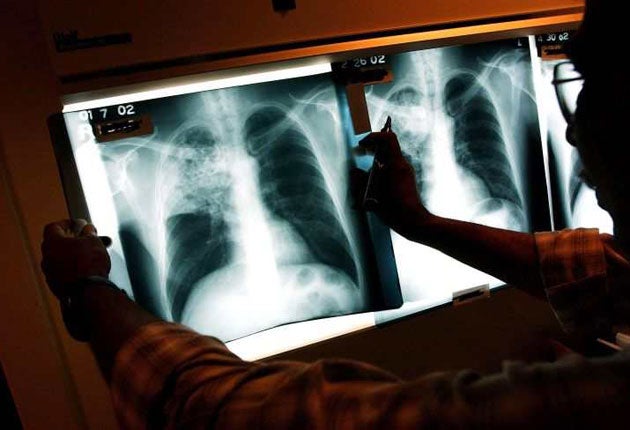TB patients slip through 'patchy' airport screening
Medical checks at Heathrow and Gatwick fail to identify cases among HIV-positive migrants

Britain risks allowing tens of thousands of people suffering from active tuberculosis into the country without treatment because of an inadequate screening programme.
Incidence of the disease is rising in the UK, and doctors warn that X-rays carried out at airports may be missing active cases because their symptoms are hidden by HIV.
TB has been on the rise in the UK for the past 10 years. In the past three, approximately five million immigrants entered the UK to settle or stay for more than six months, arriving from countries where the incidence of the disease is more than 40 cases per 100,000 people. Of these, about 203,000 had chest X-rays during health inspections at Heathrow and Gatwick airports and only 1,391, less than 1 per cent, were diagnosed with "suspected active TB" and referred to a hospital or community follow-up, according to figures provided by the Health Protection Agency. All immigrants from areas other than the EU who come to settle in the UK can be inspected and have chest X-rays on arrival from TB-afflicted areas.
Heathrow and Gatwick airports conduct chest X-rays to check immigrants for active cases of TB, but medical experts have warned this is not a sufficient safeguard. Patients with TB and HIV might not show symptoms on an X-ray because their impaired immune system can prevent an inflammatory response to the disease.
Dr Andrew Freedman, senior lecturer in infectious diseases at Cardiff University, said: "Simply doing a chest X-ray is not an adequate assessment of any patient. A normal X-ray does not rule out TB."
Dr Alan Maryon-Davis, president of the Faculty of Public Health, said: "What is clearly needed is a better screening programme. As it is now it's patchy; it's not a uniform service. We would want to see a more consistent approach. That would mean people are screened whether they come from a country with a high incidence of TB, from the EU or not from the EU." He added that many factors that favour the transmission of TB are not necessarily linked with immigration: "The people who are most at risk are those who live very closely with those that have already got TB. There are so many factors involved. Poverty, bad nutrition, HIV, overcrowding."
Dr Andy Alaszewski, professor of health studies of the University of Kent, said: "I suspect testing at the point of entry serves a more symbolic than real function, and given that other factors are likely to influence decisions to screen, such as age and apparent social status, it is likely to be selective and possibly discriminatory. It would in principle be possible to transfer the costs of screening to those wishing to enter, for instance, making it a requirement that those applying for visas have a certificate that there is no evidence they have TB."
A spokesman for the Health Protection Agency said: "We estimate that the X-ray programme at Heathrow and Gatwick identifies around 100 cases of TB a year. The key to reducing TB in the UK remains early diagnosis and treatment, and effective contact tracing."
Join our commenting forum
Join thought-provoking conversations, follow other Independent readers and see their replies
Comments
Bookmark popover
Removed from bookmarks